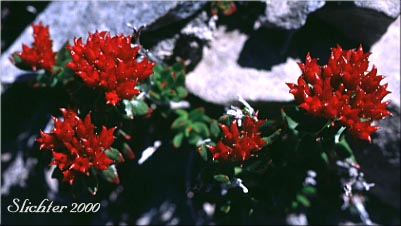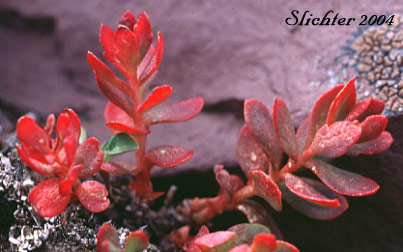 Photo
at right of roseroot (ssp. integrifolium) at Arsenic Mt., at the eastern
edge of the Bob Marshall Wilderness in the Montana Rockies.........July 27, 1999.
Photo
at right of roseroot (ssp. integrifolium) at Arsenic Mt., at the eastern
edge of the Bob Marshall Wilderness in the Montana Rockies.........July 27, 1999.
Roseroot is an attractive, succulent perennial with smooth herbage and clusters of erect stems from 3-15 cm high rising from a thick root and short, thick, fleshy rootstocks. The leaves are alternate, crowded, and oblanceolate to obovate in shape, strongly flattened but still fleshy. They measure from 7-20 mm long and are up to 1 cm wide. The margins are entire to somewhat toothed. Although they are generally green, the leaf surfaces are often covered with a bluish-white powder.
The inflorescence is a compact, flat-topped cyme or cluster of dark red to purple flowers, which are about 5 mm wide and 3-4 mm high. The 5 fleshy petals are oblong in shape with obtuse to acute tips. The measure 2-3 mm long. The sepals are oblong-lanceolate to lanceolate in shape, and are 1-2 mm long. When present, the stamens are equal in length or longer than the petals.
In looking at the USDA PLANTS website, the current classification for this plant is Rhodiola integrifolia Raf. ssp. integrifolia. Current texts for northwest plants still use the scientific names Sedum rosea var. integrifolium or Sedum integrifolium.
The leaves of roseroot are juicy and can provide liquid when water is not available. They are also high in vitamins A and C, and the leaves, shoots, and rhizomes may be eaten raw or cooked.
Stonecrops are easily propagated by leaf- or stem-cuttings. Place a stem in well-drained soil during the moist season, and it should begin to form roots quickly.
Roseroot may be found on rocky, open slopes from subalpine to alpine habitats. It is usually found where there is moisture at least during the early growing season, and may be found bordering streams and lakes.
Roseroot is a widespread species, and may be found from Alaska to Newfoundland, south with increasing elevation to the high mountains of Washington, Oregon, and California, and east in the mountains to Idaho, Montana, Colorado, and Nevada. East of the Great Plains, it may be found south to Alberta, near the Great Lakes, and in Pennsylvania, New York, and Maine. It is also found in Greenland and Eurasia.

Roseroot (ssp. integrifolium) at Arsenic Mt., at the eastern edge of the Bob Marshall Wilderness in the Montana Rockies.........July 27, 1999.
